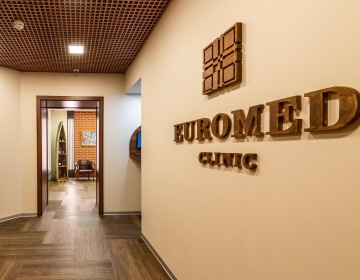Neurology
Neurology deals with examining problems of central and peripheral nervous system.
According to the statistics neurological diseases are the most spread in the world. People of all ages, even babies and even embryos can face neurological disease. Poor lifestyle, traumas, stress can be a reason of neurological disease development. Taking into consideration modern pace of life, the first features of neurological disease can appear even among young people who seem to be absolutely healthy.

Neurological symptoms are so numerous that sometimes it is difficult to realize the character of pain and identify what specialist to see. But if you have some of these symptoms, you’d better see a neurologist:
- Headache, especially strong and long headaches.
- Muscle weakness.
- Insomnia (interrupted sleep, sleeping difficulties).
- Back pain.
- Speech disturbance (when you suddenly forget how to pronounce a well-known word).
- Intense pain in nerves (On face, in hands, legs etc.).
- Frequent fainting fit, dizziness.
- Buzzing (ringing in the ears).
- Lack of energy, fatigue or tiredness, you have not had earlier.
- Lack of coordination of muscle movements (Motor disfunction).
- Lurching walk.
- Sensation disorders, crispation.
- Difficulty focusing; derangement of memory and etc.
A neurologist starts an examination with a detailed simple wellbeing examination and medical history learning. After making on-the-spot diagnosis of disease a doctor orders laboratory and instrumental tests. The most popular are:
- Angiography.
- Doppler sonography.
- CT and MR imaging.
- Electrocardiogram.
- Encephalography.
- Neurosonography.
- Polysomnographic testing and others.
Ventral neurological system includes brain and spinal chord, while peripheral system includes innervating system. There are different classes of neurological diseases:
- Infectious neurological conditions – they usually are developed as a result of viruses, bacterias, fungal or helminthic infections. Symptoms are coming from injury of the central nervous system (brain or spinal chord). Encephalitis, meningitis (brain fever) or malaria are illustrative of this type of disease.
- Genetic and chromosomal pathologies – they are the consequent of genetic material hurt in case of gene-mutation (illness in amino acid and lipid exchange) or in case of chromosomal abnormality (Down or Edwards' syndromes). Genetic predisposition takes importance for sacred disease, Alzheimer disease or disseminated sclerosis.
- Traumatic neurological disorders are connected with lesions in central and peripheral segments. The most spread are concussion of the brain, traumas in spinal chord, ischialgia.
- Tumors of central neurological system are very common nowadays. Benign conditions and malignant neoplasms press on nerve tissues and damage them.
- Vascular Neurologic pathologies are connected with blood supply disturbance and nutrition of neurologic structures, mainly in cerebras. It can be a reason of cerebral crisis and apoplexy.
In case you have any neurological disease or problems it is very important to sound the alarm as early as possible and to visit a doctor. If there is a reason to suspect any neurologic problems it is better to make all necessary tests and examinations immediately.

«Health and Travel» is your way to health!


